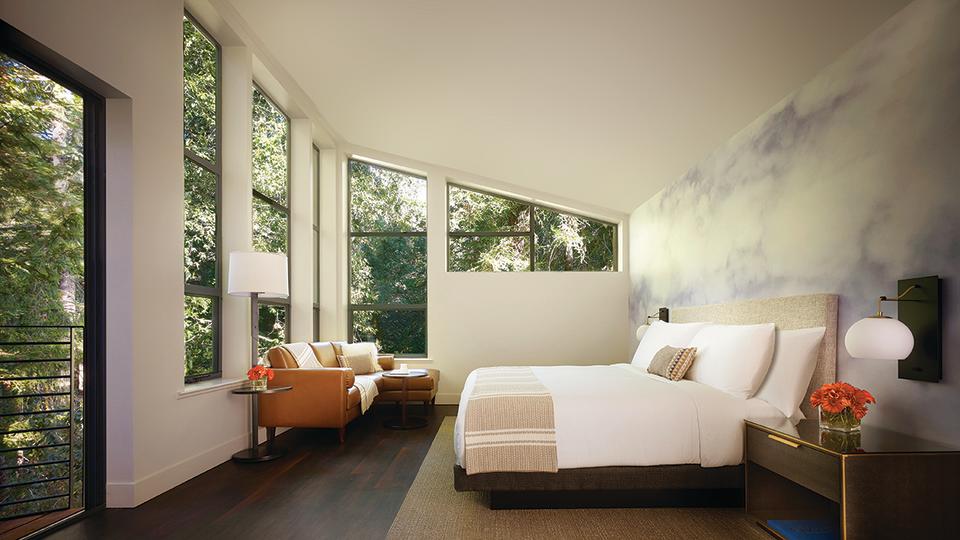Facials, Massage, Psychotherapy? Why More Luxe Hotels Are Providing Onsite Shrinks for Guests

Resorts were a place to go to escape life’s problems, not confront them. A peaceful hike, a dip in the pool, or a round of golf was enough for many to return home feeling like a new person. Now, guests expect more. Instead of R&R, some are seeking more permanent transformation and are adding therapy to their itinerary to achieve it.
“People are coming here because they want something more of themselves,” says Amy Hawthorne, director of Canyon Ranch’s Mental Health & Wellbeing in Tucson, Az., and Lenox, Mass.
More from Robb Report
A Luxe New Wellness Club Is Opening in N.Y.C This Spring-Just Don't Call It a Gym
Supermodel John Pearson on Hot Yoga, Ayahuasca, and Losing His Vintage Omega
Hawthorne says while their guests are already eating well and exercising, they still feel like something’s missing. “They hit a wall and say, ‘I just can’t continue living the way I’m living,’” she says.
Iconic destination spas such as Canyon Ranch, Golden Door in Southern California, and Miraval in Arizona began to expand their mental well-being classes and therapy services after the pandemic when people began to prioritize their emotional needs and “mental health” became a buzzword. Sessions will set you back anywhere from $215 to $350 per couple per hour.

Now, hotels and resorts are following suit, offering mental health retreats throughout the year and, increasingly, on-staff psychotherapists, such as the team at New Life Portugal, a two-year-old wellness resort in the western Serra Da Estrela mountains. It delivers customized treatments for anxiety, depression, grief, and relationships, in addition to traditional wellness experiences such as yoga, massage, swimming, sauna, and guided nature hikes.
Heckfield Place, a 438-acre estate in Hampshire, a little over an hour’s train ride from London, began piloting nature therapy services to its Bothy spa guests in 2022. It recently launched its Reconnect stay with a psychodynamic wellness assessment followed by physical spa services and mental health treatment held out in nature. One guest referred to it as “massage for your mind.”
For wellness resorts, having a therapist on-site or on-call has become a way to create a safe space for guests to process the strong emotions experienced during breathwork, meditation, or Reiki. As these inward-turning spiritual practices have grown in popularity, so has the need for therapy consults as a way to help guests make sense of what they’re feeling, says Laura Montesanti, founder of Synergy, a wellness retreat trade show.

Years ago, you wouldn’t see a resort advertising a trauma specialist or explicit help for addiction, depression, or anxiety. Instead, “life management” was the code word for mental-health support when Hawthorne started at Canyon Ranch in 2016. “There was some concern about alienating people who didn’t want to say that they were coming in to see a therapist,” she says.
Now, traveling to seek help with issues like addictions or marital problems has become as normal as a facial.
At the Saratoga Arms Hotel in New York’s Adirondacks, couples can book a package that includes intention-setting for their relationship and a three-hour session with an in-house licensed sex and relationship therapist, as well as Champagne and locally sourced cuisine. It costs about $1,700.
Danielle Hering, a licensed marriage and family therapist at Golden Door, says she never thought she would be offering therapy sessions at a spa. But after she discovered the power of breathwork and beginning to teach it to guests at the tranquil Japanese-style spa, guest services asked her to consider offering private therapy sessions as well.
Now, Hering includes mental-health consultations in a package of services that includes breathwork and Eye Movement Desensitization and Reprocessing (EMDR). These techniques are said to help resolve everything from grief to childhood trauma and phobias.
“The number of sessions I do a week has significantly increased,” Hering said. “[Guests] know they need help and are willing to ask for it now that there is less stigma around mental health.”
The reasons to attempt to plumb the depths of your trauma at a resort—rather than in an office or over Zoom—are manifold, therapists said. First, you are in a relaxed and vulnerable state at a resort. You are doing things you might not do at home, such as breathwork or melting into the floor in an evening sound bath. Your favorite five-star also comes with a level of trust. You are confident that you are being given the best of all things—including headshrinkers. Finally, while a deep dive into your PTSD on holiday isn’t going to be for everyone, putting it on the spa menu allows guests to test-drive therapies they might be frightened to try in a more formal environment.
“We plant some seeds for them to go back out into the community to seek out the support they need,” said Miraval’s Lyndi Rivers, a licensed master social worker with 30 years of trauma experience who joined the Tucson spa as an integrative wellness specialist. “We help them figure out how they want to be as they move through the world.”
Best of Robb Report
The Ultimate Miami Spa Guide: 15 Luxurious Places to Treat Yourself
The 7 Most Insanely Luxurious Spas in the World, From Tokyo to Iceland
17 Reasons the Caribbean Should Be at the Top of Your Travel Itinerary
Sign up for Robb Report's Newsletter. For the latest news, follow us on Facebook, Twitter, and Instagram.

